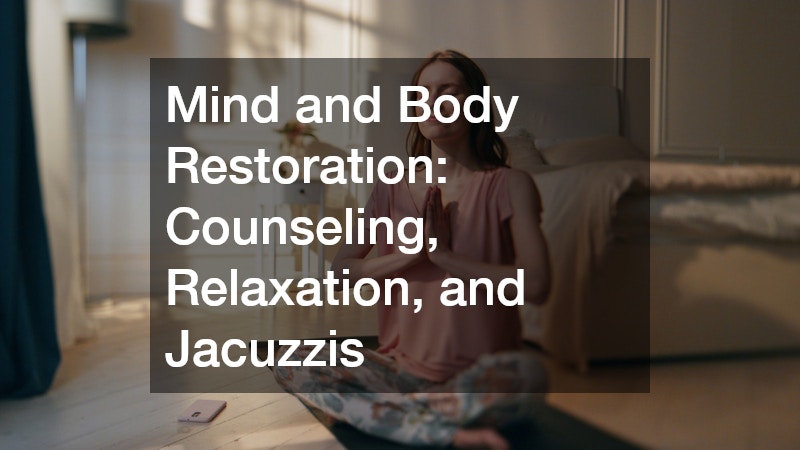In today’s fast-paced world, it’s easy to neglect health until pain, fatigue, or chronic stress become overwhelming. Relief care offers a path forward, bridging the gap between addressing immediate discomfort and cultivating long-term wellness. Unlike quick fixes, relief care encourages a holistic approach that integrates physical healing, lifestyle improvements, and mental balance. Whether you’re struggling with persistent aches, recovering from an injury, or simply seeking to feel more energized, focusing on wellness through relief care can help you create sustainable habits that lead to a healthier, more fulfilling life.
Nourishment From the Inside: How Superfoods Support Recovery
Food plays a central role in wellness, and incorporating superfood health supplements into your daily routine can significantly improve recovery and resilience. These supplements are rich in antioxidants, vitamins, and minerals that promote cellular repair, reduce inflammation, and strengthen the immune system. For example, spirulina, turmeric, and omega-3s have been studied for their ability to reduce oxidative stress and support cardiovascular health, making them valuable additions to any wellness plan.
Relief care isn’t just about addressing discomfort—it’s about replenishing the body with what it needs to thrive. According to the National Institutes of Health, nutrient deficiencies affect nearly one-third of the global population, underscoring the importance of nutritional support. When paired with a balanced diet, superfoods provide an effective way to fuel the body for long-term recovery and energy.
An actionable step is to work with a nutrition professional or wellness provider who can recommend supplements tailored to your needs. Starting with small, consistent changes—like adding a green powder to smoothies or swapping processed snacks for nutrient-dense options—can have a big impact over time.
Restoring Balance With Medspa Services
Stress and tension often build up in the body, making it harder to heal. Medspa services, such as massage therapy, acupuncture, and skin treatments, provide both physical and psychological relief. These treatments not only address outward signs of stress but also create an environment where the body can relax and regenerate.
Research published in the Journal of Alternative and Complementary Medicine shows that massage can reduce cortisol (the stress hormone) by up to 31%, while increasing serotonin and dopamine—neurotransmitters that boost mood and overall well-being. Relief care incorporates these kinds of services as part of a comprehensive wellness plan, helping individuals find calm while their bodies heal from strain or injury.
To make the most of medspa services, schedule regular appointments rather than waiting until stress becomes unbearable. Even one session a month can create measurable improvements in mood, circulation, and sleep quality, laying a foundation for long-term recovery.
The Role of Wellness Services in Everyday Life
Wellness services encompass a wide range of offerings, from nutrition coaching to stress management workshops. These resources are designed to help individuals build healthier routines, stay motivated, and address the root causes of health concerns. Relief care often begins with small, guided steps in these areas, leading to significant long-term changes.
For example, many people underestimate the power of sleep in recovery. The Centers for Disease Control and Prevention reports that one-third of adults do not get enough rest, which can lead to chronic disease risks. By using wellness services such as sleep coaching or mindfulness training, individuals can improve rest quality, making the body more capable of healing and fighting illness. In addition, wellness providers often integrate other recovery methods—like nutritional guidance or physical activity support—that create a more holistic foundation for health.
What makes these services so impactful is their accessibility. Unlike intensive medical interventions, many wellness services can be incorporated into daily routines without major disruption. Stress-reduction classes, nutritional counseling, or group workshops can all be adapted to personal schedules, making consistency achievable. Relief care thrives on these consistent practices, reinforcing habits that gradually reduce pain, improve energy, and enhance overall well-being.
To put this into practice, try starting with one wellness service that aligns with your goals. If stress is a major factor, a mindfulness workshop may be ideal. If nutrition feels overwhelming, seek guidance from a wellness coach. These targeted approaches create manageable steps toward sustainable wellness, empowering individuals to take ownership of their long-term recovery.

Functional Medicine Services for Personalized Healing
One of the cornerstones of effective relief care is personalization. Functional medicine services stand out because they look beyond symptoms, investigating the root causes of health issues. This often involves comprehensive testing, lifestyle assessments, and individualized treatment plans.
For example, a person with recurring migraines may discover that poor gut health or unbalanced hormones are contributing factors. Rather than masking the pain with medication alone, functional medicine aims to restore balance. According to the Institute for Functional Medicine, nearly 90% of chronic disease risk can be linked to lifestyle and environmental factors, highlighting the importance of a comprehensive approach.
Another key benefit of functional medicine services is that they empower individuals to become active participants in their own recovery. Instead of passively receiving treatment, patients collaborate with providers to make meaningful changes in diet, exercise, sleep, and stress management. This collaborative model is essential to relief care because it ensures that healing is not only targeted but also sustainable. For instance, someone dealing with chronic fatigue might undergo advanced lab testing, revealing nutrient deficiencies or thyroid imbalances. With this knowledge, the treatment plan could include superfood health supplements, stress-reduction techniques, and personalized exercise programs designed to restore energy.
Functional medicine also encourages preventive action. By addressing small imbalances before they escalate into serious conditions, individuals can avoid unnecessary suffering and medical costs. This proactive mindset makes relief care more effective, as it shifts the focus from temporary symptom management to long-term vitality.
Actionable advice includes seeking a provider who specializes in functional medicine and asking for a full assessment. By understanding your body’s unique triggers—whether they stem from diet, stress, or environmental toxins—you can adopt a strategy that leads to lasting wellness and meaningful recovery. For those new to this approach, starting with a simple consultation can open the door to deeper insights, making relief care a truly transformative journey.
Clean Water, Clean Body: The Importance of a Water Filtration System
Hydration is often overlooked in conversations about recovery, but the quality of water you drink matters just as much as the quantity. A home water filtration system can significantly reduce exposure to contaminants such as lead, chlorine, and microplastics, all of which may interfere with healing.
According to the Environmental Working Group, more than 250 different contaminants have been detected in U.S. tap water. Relief care emphasizes removing unnecessary toxins so the body can focus on repairing itself. Clean, filtered water helps improve digestion, supports detoxification, and enhances energy levels. This becomes especially important for those recovering from illness or chronic stress, as the body needs every advantage possible to rebuild and restore balance.
Beyond health, filtered water also improves taste and encourages consistent hydration. Many people unknowingly drink less water because tap water tastes or smells unpleasant. A reliable water filtration system not only removes harmful substances but also enhances freshness, making it easier to reach daily hydration goals. Staying hydrated supports everything from joint lubrication to nutrient absorption, both of which are key components of relief care and long-term wellness.
There are several types of filtration systems available, and the right choice often depends on your lifestyle. Countertop or pitcher filters are cost-effective and ideal for renters, while whole-house systems provide the most comprehensive protection. Some advanced systems can even target specific contaminants identified in local water reports.
An actionable step is to invest in a system that matches your needs and pair it with intentional hydration habits. Keep a reusable water bottle with you throughout the day and aim for steady intake rather than occasional large amounts. This simple but powerful habit supports recovery by giving your body the clean fuel it needs to heal and thrive.

Moving Toward Strength: Fitness Clubs and Workout Equipment
Movement is essential to recovery and overall wellness. Fitness clubs provide structured environments, access to expert trainers, and a variety of workout equipment designed to strengthen the body. Relief care incorporates exercise not as punishment, but as a way to build resilience, mobility, and confidence.
The American Heart Association recommends at least 150 minutes of moderate exercise each week, noting that physical activity reduces the risk of chronic conditions like heart disease, type 2 diabetes, and certain cancers. Exercise also boosts endorphins, which act as natural painkillers, further supporting recovery. For individuals dealing with stress, depression, or chronic discomfort, regular exercise becomes a cornerstone of relief care by improving mood and increasing overall energy levels.
A major advantage of joining a fitness club is the sense of community. Working out alongside others can provide accountability and encouragement, which helps people stay consistent with their wellness goals. Group classes like yoga, cycling, or Pilates also promote social connection while improving flexibility and strength. For those who prefer privacy, home workout equipment offers flexibility. Treadmills, resistance bands, and kettlebells are excellent tools for creating effective routines in the comfort of your own space.
Another important consideration is progression. Starting slow and gradually building intensity reduces the risk of injury and makes exercise more enjoyable. Relief care emphasizes sustainability, so even short daily walks or light stretching routines count as meaningful progress. Pairing regular movement with recovery techniques—such as stretching, foam rolling, or medspa services—ensures the body can repair itself efficiently, turning exercise into a long-term path toward healing and vitality.
Aligning the Body: Local Chiropractor Support
Many people experience pain and stiffness due to misalignments in the spine or joints. Relief care often includes working with a local chiropractor to restore alignment, reduce pain, and improve mobility. Chiropractors focus on the musculoskeletal system, and regular adjustments can have a ripple effect on overall wellness.
Studies in the Journal of Manipulative and Physiological Therapeutics show that chiropractic care can significantly reduce lower back pain, which affects 80% of adults at some point in their lives. Beyond pain relief, adjustments may also support nervous system function, making it easier for the body to self-regulate and recover.
To get started, schedule a consultation with a reputable chiropractor in your area. Ask about personalized treatment plans and how chiropractic adjustments can complement other wellness strategies like exercise and nutrition. Integrating chiropractic support with other relief care measures ensures a balanced, comprehensive approach to recovery.
Mind and Body Restoration: Counseling, Relaxation, and Jacuzzis
Lasting wellness goes beyond physical recovery—it also requires mental and emotional care. Counseling services play a vital role in relief care, helping individuals manage stress, process trauma, and develop healthier coping mechanisms. Mental health support is particularly important because unresolved emotional challenges can manifest as physical symptoms, making recovery more difficult.
In addition to professional counseling, relaxation practices are invaluable. Simple lifestyle upgrades, like spending time in jacuzzis, can promote muscle relaxation, improve circulation, and create opportunities for mindfulness. According to the National Institute of Mental Health, nearly one in five U.S. adults lives with a mental health condition, highlighting the importance of integrated approaches that care for both mind and body.
To take action, consider combining counseling services with relaxation rituals. For example, set aside time each week for therapy sessions and complement them with a self-care routine at home, such as warm baths, meditation, or gentle stretching. This balance fosters resilience, encouraging both mental clarity and physical recovery.
Relief care is not a one-time fix—it’s a journey toward lasting wellness and recovery. By integrating superfood health supplements, medspa services, wellness services, functional medicine services, water filtration systems, fitness clubs, local chiropractors, workout equipment, counseling services, and even jacuzzis, individuals can create a holistic approach that addresses the mind, body, and spirit.
Every choice you make—from the water you drink to the way you move—contributes to your body’s ability to heal. Relief care offers the framework for aligning those choices into a sustainable lifestyle. Whether you’re recovering from injury, managing chronic pain, or simply striving to feel better each day, this path empowers you to take control of your health and create a stronger foundation for the future.





